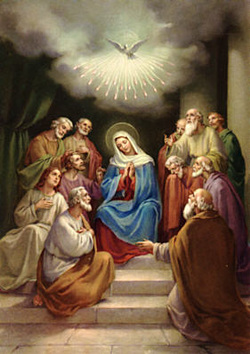
“Cum complerentur dies Pentecostes….” So begin our Scriptures today, fifty days after the Resurrection: when were completed the days of Pentecost…, bringing the Church’s longest liturgical season to a spectacular conclusion. We extinguish the Paschal candle at the end of Mass, singing the double Alleluia after the dismissal one more time, recalling the Alleluias of the Easter Octave seven weeks ago. Pentecost is the birthday of the Church, 1,980 years old today, born at that first Pentecost and renewed each year on this feast. Perhaps we should have a birthday cake for Holy Mother Church with 1,980 candles on it.
Two Stories of Pentecost
Scripture gives us two accounts of this birth of the Church. Our First reading, from Acts 2, gives us the more familiar story, truly spectacular. On the 50th day after the resurrection, the apostles were praying around Our Lady when a blast like a strong driving wind—a howling, whistling sound—came from the sky, filling the building, rocking its foundations. Sheets of fire appeared in the air, descending on each of them, and they began to speak in different tongues. But, marvelously, the people could understand these strange languages—Parthians, Medes, Elamites, Egyptians, Romans, Lybians, and Arabs. Babel was reversed! From many languages, one word, which all peoples could understand: Jesus Christ is Lord! The Church was born, and it was born Catholic, a universal Church, a Church for all nations, as it is very much so even unto our time. In the Archdiocese of Los Angeles, for example, Mass is said every Sunday in 49 different languages. And what did these Parthians and Medes and Egyptians hear, in their own language? The “Mighty Acts of God.” If only we could speak of the mighty acts of God to the non-believers of our time in a language they could understand! We can indeed, but only through the Holy Spirit. Let us never cease praying to him for the gift of tongues.
The Second Story of the Holy Spirit’s coming is found in our Gospel, from John 20. Not 50 days after the resurrection, but the very evening of that same day, Jesus walks through the walls of the apostles’ hideout. He bestows upon them the fruits of the Spirit, Love, peace and joy: “Peace be with you,” Jesus says, “and the disciples rejoiced.” He breathed on them, and then sent them out to bring peace and joy to others. How? By hearing confessions. The first task he gives them, immediately after imparting the Holy Spirit, is this: “whose sins you forgive are forgiven them…”
Life in the Spirit
And so the Holy Spirit brings the Church into existence, and continues, infallibly, the work of Christ on earth. It is for us to live spiritual lives, as St. Paul says in the second reading. Those in the flesh cannot please God. They cannot even please themselves. Joy and peace will elude whoever lives a merely carnal life, apart from the Holy Spirit. “We are not debtors to the flesh,” Paul insists. If you live according to the flesh, you will die. Yet most of us do live a good deal of our lives in the flesh. Consider: what do you think of when you get up in the morning? Breakfast, of course. What do you think of after breakfast? How long until lunch, of course. Other tyrannies of the flesh, more nefarious, besiege us too. If we live “according to them,” life is not worth living. “We will die” in the words of Paul—we are already dead. We must continually insist on our spiritual lives, our prayer lives, and discipline the body with penances and mortifications. Only a son who works hard and sacrifices himself can call God “Abba, Father.”
Our Lady, Spouse of the Holy Spirit
In this month of May, we turn to Our Lady, spouse of the Holy Spirit. No human being knows the Third Person of God better than she, who submitted her body and soul to him at the Annunciation. As she brings us to her Son, so she brings us to her Spouse. When we pray “Hail Mary, Full of Grace,” we pray to her who is full of the Holy Spirit. Please, Blessed Mother, bring us to the Holy Spirit, that our lives may be spiritual, pure and beautiful, like yours.


 RSS Feed
RSS Feed